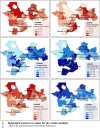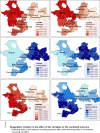Place-specific factors associated with adverse maternal and perinatal outcomes in Southern Mozambique: a retrospective cohort study
- PMID: 30782892
- PMCID: PMC6367983
- DOI: 10.1136/bmjopen-2018-024042
Place-specific factors associated with adverse maternal and perinatal outcomes in Southern Mozambique: a retrospective cohort study
Abstract
Objectives: To identify and measure the place-specific determinants that are associated with adverse maternal and perinatal outcomes in the southern region of Mozambique.
Design: Retrospective cohort study. Choice of variables informed by literature and Delphi consensus.
Setting: Study conducted during the baseline phase of a community level intervention for pre-eclampsia that was led by community health workers.
Participants: A household census identified 50 493 households that were home to 80 483 women of reproductive age (age 12-49 years). Of these women, 14 617 had been pregnant in the 12 months prior to the census, of which 9172 (61.6%) had completed their pregnancies.
Primary and secondary outcome measures: A combined fetal, maternal and neonatal outcome was calculated for all women with completed pregnancies.
Results: A total of six variables were statistically significant (p≤0.05) in explaining the combined outcome. These included: geographic isolation, flood proneness, access to an improved latrine, average age of reproductive age woman, family support and fertility rates. The performance of the ordinary least squares model was an adjusted R2=0.69. Three of the variables (isolation, latrine score and family support) showed significant geographic variability in their effect on rates of adverse outcome. Accounting for this modest non-stationary effect through geographically weighted regression increased the adjusted R2 to 0.71.
Conclusions: The community exploration was successful in identifying context-specific determinants of maternal health. The results highlight the need for designing targeted interventions that address the place-specific social determinants of maternal health in the study area. The geographic process of identifying and measuring these determinants, therefore, has implications for multisectoral collaboration.
Trial registration number: NCT01911494.
Keywords: geostatistics; global health; health geography; maternal health; spatial epidemiology.
© Author(s) (or their employer(s)) 2019. Re-use permitted under CC BY. Published by BMJ.
Conflict of interest statement
Competing interests: None declared.
Figures





References
-
- United Nations. The Global strategy for women’s, children’s and adolescents’ health (2016–2030) [Internet]. New York, 2015. http://www.who.int/life-course/partners/global-strategy/globalstrategyre....
-
- United Nations. Transforming our world: the 2030 Agenda for Sustainable Development. See Relat Glob Initiat Transnatl Organ Crime“Organized Crime Cross-Cut Threat Sustain Dev, 2015.
-
- World Health Organization. Strategies towards ending preventable maternal mortality (EPMM). 2015.
Publication types
MeSH terms
Associated data
LinkOut - more resources
Full Text Sources
Medical
